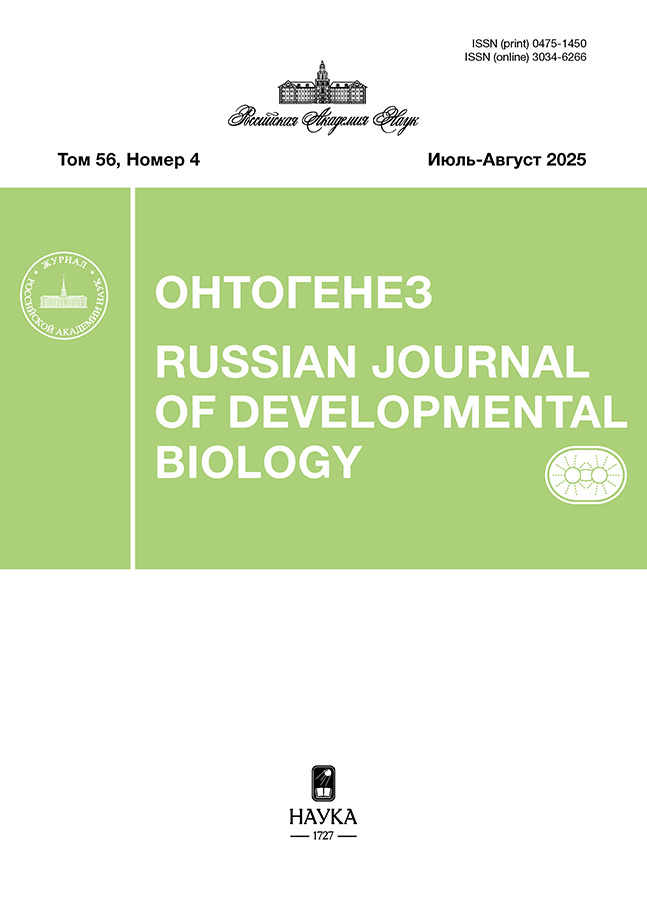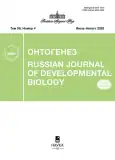Vol 56, No 4 (2025)
REVIEWS
What spontaneous floral variations reveal about the regulation of flower development
Abstract
The regularitiesof floral development can be studied by analyzing spontaneous variationin flowers observed at both the intraspecific and within-individual levels.In the case of floral organs arranged in a whorl,their number (merism) can vary due to fluctuations in thesize of the floral meristem and its proliferation rate. Onesource of meristic variation is the architecture of the inflorescence:flowers with different structures may belong to different branching orders,and the true terminal flower tends to exhibit lower stability.The variability of the abaxial and adaxial floral domains isunequal. For example, in the monosymmetric corolla of Leguminosae, theadaxial petal is the most stable, which aligns with itsevolutionary conservatism within the family. A higher frequency of spontaneousvariation in the androecium, compared to other floral whorls, ishypothesized to follow the general biological rule that later-developing structurestend to be more variable. Correlations among the number oforgans in different floral whorls can help identify the principlesof floral patterning. In some taxa, the position of organsin each whorl is influenced by the position of thepreceding whorl (acropetal patterning). In other lineages, the arrangement ofstamens is influenced by the gynoecium (basipetal patterning of theandroecium). The inner androecial whorl can be patterned under theinfluence of the gynoecium, whereas the number and position ofouter stamens are determined by the perianth. In cases ofspontaneous floral fluctuation, whorls that are coordinated in terms ofpatterning exhibit a higher correlation in their merism.
 131-142
131-142


Original study articles
Characteristics of the latent and pregenerative periods in the development of Dianthus L. species in the Cis-Ural region of Bashkortostan
Abstract
The initial stagesof ontogenesis of species of the genusDianthusL. (carnation):D. barbatusL.,D. carthusianorumL.,D. giganteusd’Urv,D. hypanicusAndrz.,D.knappii(Pant.) Asch. & Kanitz exBorbas,D. oschtenicusGalushko,D. plumariusL. are described. The research was conducted inthe continental climate conditions of the Bashkir Cis-Ural, at theSouth-Ural Botanical Garden-Institute of Ufa Federal Center of Russian Academyof Sciences (SUBGI UFRC RAS). The following tasks were solvedduring the research: two age periods were described–latent,pregenerative and 4 age states (seedlings, juvenile, immature and virginile);the signs characteristic of each state are described; the morphologicalparameters of plants are characterized; the developmental features of thestudied species in the initial periods of ontogenesis are revealed.Marker features of pregenerative ontogenetic states of carnation (sprouts, juvenile,immature, virginal plants) are identified, and the duration of stayin each of them is indicated.
 143-151
143-151


Short communications
FIRST RECORD ON THE DEVELOPMENT OF PERIBLASTIC SINUS IN EMBRYOGENESIS OF PACIFIC RAINBOW SMELTOSMERUSDENTEX(OSMERIDAE)
Abstract
An experimental studyof the embryonic development of the Pacific rainbow smeltOsmerusdentexSteindachner et Kner, 1870 inhabiting in the Tauy river(Tauy Bay of the northern part of the Sea ofOkhotsk) was conducted. For the first time for the speciesand for representatives of the genus Osmerus, a previously unremarkedin the literature stage of the periblastic sinus was established–a provisional organ, the development of which (as inmany representatives of Salmoniformes) begins at the end of thegastrulation and epiboly step, and ends at the organogenesis step.
 152-156
152-156










